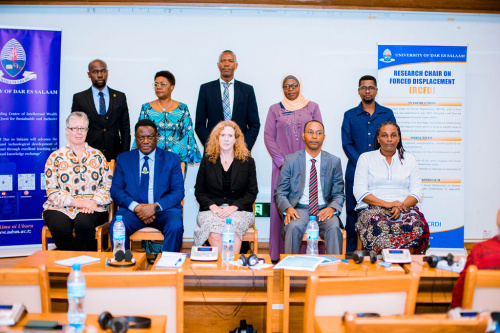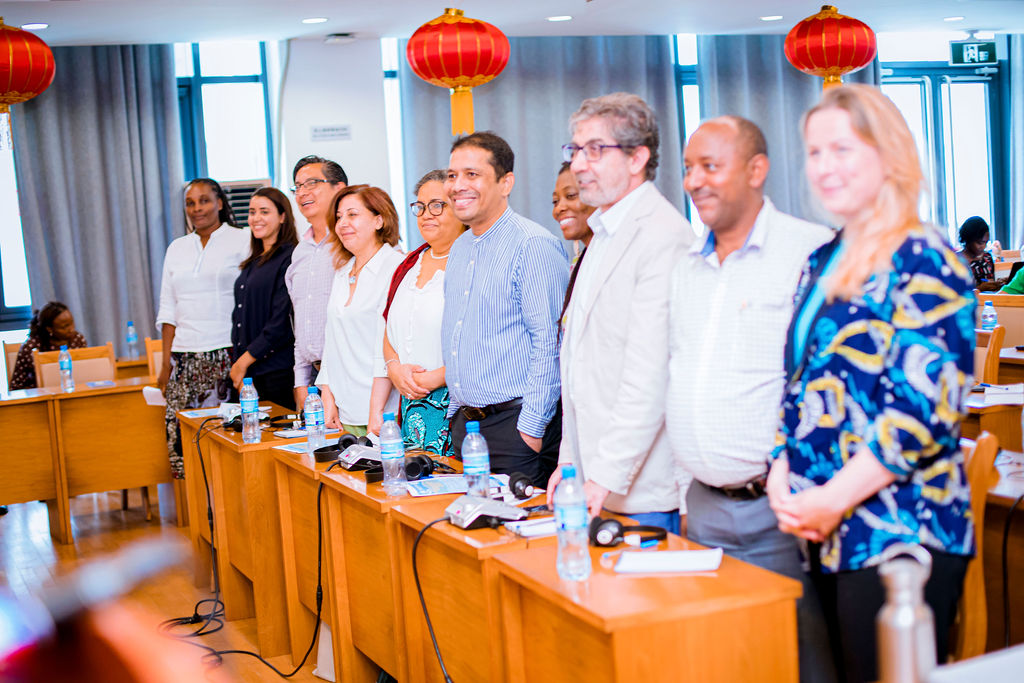UDSM Launches Research Chair on Forced Displacement
By Mercy Machange, CMU
The University of Dar es Salaam has launched a Research Chair on Forced Displacement (UDSM-RCFD) and reiterated its commitment to ensuring inclusivity and scholarly contribution to addressing the global challenge of forced migration.
Speaking during the launch on 29th May 2023, the Acting Vice Chancellor, who is also the Deputy Vice Chancellor-Academic, Prof. Bonaventure Rutinwa, emphasized that the University was committed to ensuring inclusivity and global development due to the urgency of the issues.
“Our University is at the forefront of efforts to ensure that no one is left behind in this development process as we work toward a global commitment to improve the lives of those who are least fortunate in the world”, said Prof. Rutinwa.
Prof. Rutinwa expressed his optimism that the Research Chair would empower scholars to explore various facets of forced displacement, contributing to the achievement of the 2030 Sustainable Development Goals. He emphasized that the Chair's objective was to provide solutions and promote peaceful living for all individuals affected by forced migration.
The distinguished guest of honor who graced this the event, the Acting High Commissioner of Canada in Tanzania, Helen Fytche, said her office was ready to lend support and expertise to this crucial endeavor. “Forced migration is a growing concern affecting numerous lives; it is a global problem that requires collective action”.
Hon. Hellen Fytche also acknowledged the significance of the works the Research Chair would be dealing with in tackling the challenges faced by displaced individuals and communities.
32 members involved
Meanwhile the Chairperson of the University of Dar es Salaam Research Chair on Forced Displacement, Dr. Opportuna Kweka, said its research will involve 32 members from different countries, which will initially focus on Tanzania and East Africa before expanding globally.
“The Chair aims to comprehensively address forced migration issue through research, outreach programs, seminars, policy debates, and support for young researchers and internship programs”, said Dr. Kweka.
She also highlighted the chair's unique inclusive and multidisciplinary approach, emphasizing that the research activities would be internally managed at the University, including funding arrangements.
Dr. Kweka also said that, for the chair’s effective undertakings, collaborative partnerships with other higher learning and research institutions and researchers have already been established. The institutions include the University of Dodoma and the Mwalimu Nyerere University of Agriculture and Technology. Researchers come from various countries such as Morocco, Ethiopia, Burkina Faso, Ghana, Lebanon, India, Peru, Thailand, and the Dominican Republic.
Other News
Sun, 10.Nov.2024 : UDSM na UH vyafanikisha upatikanaji wa Kamusi ya Kihispania-KiswahiliFri, 08.Nov.2024 : UDASA Bonanza 2024 picks up vibes
Fri, 01.Nov.2024 : Robotics Bootcamp attracts hundreds of young talents to UDSM, sparks passion for Physics and Technology
Wed, 30.Oct.2024 : Dr. Jackson Justo drives AI-powered energy innovations for sustainable future
Thu, 24.Oct.2024 : Partnership with NMB promises innovation, talent development and digital transformation at UDSM
Wed, 09.Oct.2024 : Economics don Dr. Innocensia John is named among 2024 top Agri-Food Pioneers
Tue, 08.Oct.2024 : School of Mines and Geosciences gears up for Helium exploration in Tanzania
Sat, 05.Oct.2024 : UDSM students excel in 2024 NGEA Award Regional Challenge






